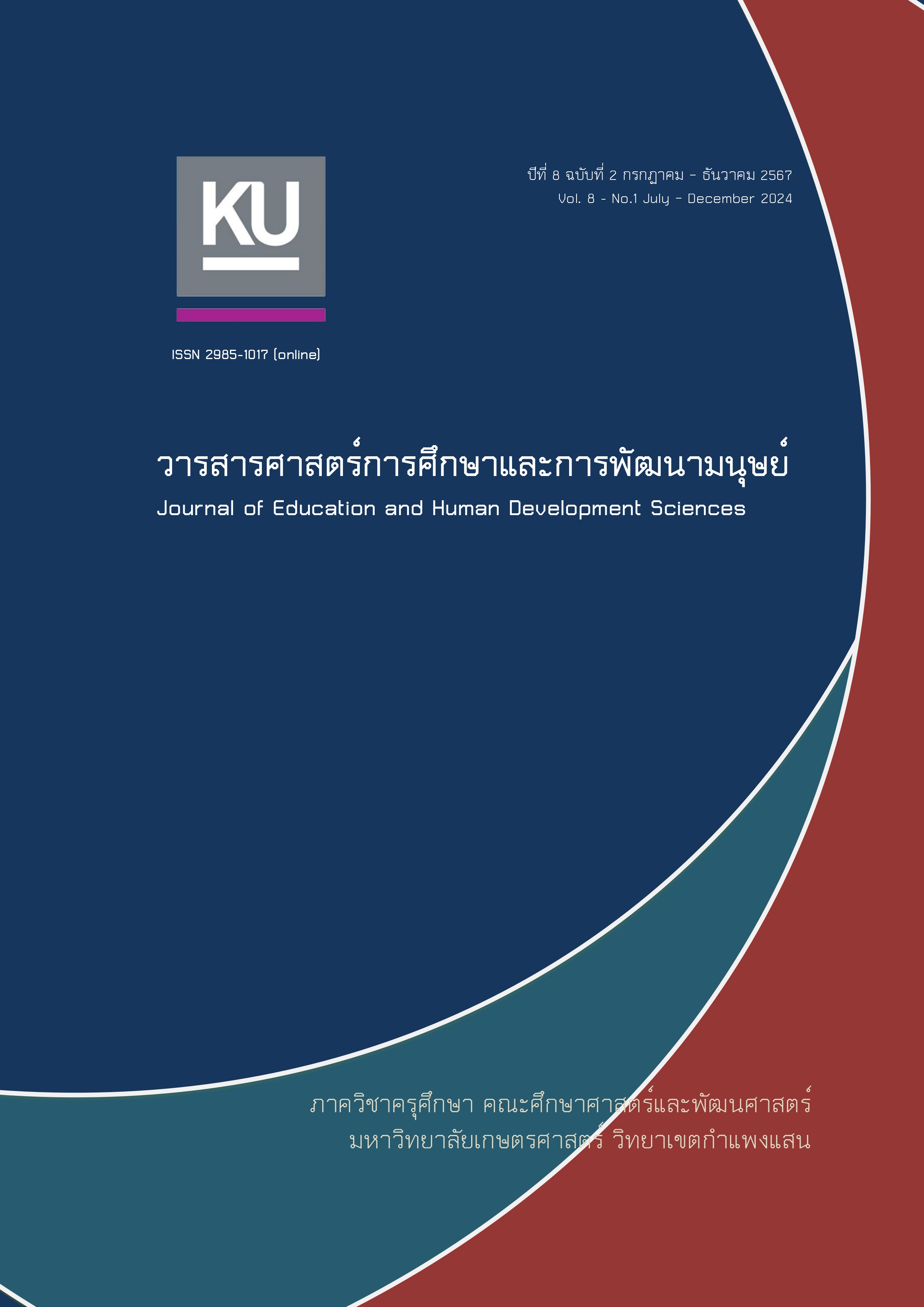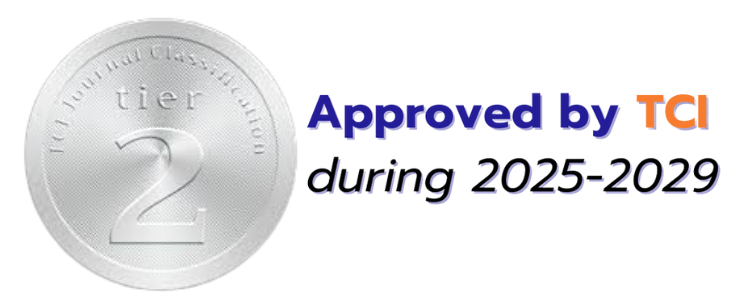The development of a critical thinking skills training process to enhance moral using the Four Noble Truths principle through learning based on Constructivist theory for first-year students, Faculty of education, Ubon Ratchathani Rajabhat University
Keywords:
Critical thinking, Morality, Enhancement of moralityAbstract
This research aims 1) to develop a process for enhancing morality through the development of critical thinking skills, utilizing constructivist theory in learning, and 2) to compare the moral critical thinking skills of first-year undergraduate students between the experimental group and the control group after using a process for enhancing morality. The population was 509 first-year students, the academic year 2023 under the faculty of education, Ubon Ratchathani Rajabhat University. The rights-protected sample consisted of two groups, group 1 was 95 students who were randomized by simple technique for surveying their moral judgment skills, and group 2 consisted of 40 students who were randomized by simple technique. Then, they were matched in pairs into an experimental group and a control group with 20 students per group for comparing their critical thinking skills. The instruments were 1) the moral judgment test, 2) a set of process to practice critical thinking skills to enhance morality, and 3) the morality critical thinking skills test. The data analysis employed descriptive statistics such as, frequency, percentage, mean, and standard deviation, as well as inferential statistics which was t-test.
The findings were as follows:
- The process for practicing critical thinking skills consisted of four steps: (1) practice identifying problems; (2) practice analyzing the causes of problems; (3) practice setting goals for solving problems; and (4) practice approaching solutions. These steps were launched through 11 learning activities.
- The moral critical thinking skills of students who passed process to practice critical thinking skills in the experimental group were higher than those in the control group at the .05 level of statistical significance.
Downloads
References
Anantasuk, N. & Mangkorn, M. (2020). A Study of the Results of Learning Management According to Constructivist Theory to Promote Academic Achievement in Social Studies Subjects and Satisfaction of Mathayomsuksa 4 Students. Education journal, 3(2), 40 - 49.
Anggraeny, E., & Khongput, S. (2022). Teachers’ perceptions and practices of critical thinking instruction in Indonesian senior high schools: A case study. TEFLIN Journal: A Publication on the Teaching & Learning of English, 33(1), 1 – 26. http://dx.doi.org/10.15639/teflinjournal.v33i1/1-26
Auntum, P., Kaewsiri, S., & Inthaya, Y. (2015). Problem solving thinking by four noble truths method on economics subject for prathomsuksa 6 students at watkukum school, San Patong district, Chiang Mai Province. Ganesha Journal, 11(1), 69 – 75.
Bennett, C., & Bennett, J. L. (2022). Five suggested soft skills learning objectives for enhancing undergraduate accounting curriculum. Journal of Instructional Pedagogies, 27, 1 – 14.
Ben-Shahar, T. H. (2023). Merit, opportunity, and the future of higher education. In: Sardoč, M. (eds) Handbook of Equality of Opportunity. Springer, Cham. https://doi.org/10.1007/978-3-319-52269-2_92-1
Bezjian, J., Godinez, J., Dean, B. P., & Wright, S. L. (2023). Teaching lewin's model on change management: Lessons from the cool runnings film. Journal of Instructional Pedagogies, 29, 1 – 18.
Chatfield, T. (2022). Critical thinking: Your guide to effective argument, successful analysis and independent study. London : Sage.
Dewey, J. (1910). How we think. Boston: D.C. Heath. Retrieved from https://archive.org/details/howwethink 000838mbp /page/n13/mode/2up
Ding, K.; & Li, H. (2023). Digital addiction intervention for children and adolescents: A scoping review. International Journal of Environmental Research and Public Health, 20(6), 4777. https://doi.org/ 10.3390/ijerph20064777
Duffy, T. M., & Cunningham, D. J. (1996). Constructivism: implications for the design and delivery of instruction. In D. H. Jonassen (Ed.), Handbook of Research for Educational Communications and Technology. NY: Macmillan. Retrieved from https://homepages.gac.edu/~mkoomen/edu241/ constructivism.pdf
Dung, N. T., & Nga, N. T. T. (2023). Improve the quality of ethical education for Vietnamese students today. International Journal of Advanced Multidisciplinary Research and Studies, 3(6), 1057 – 1060.
Dunn, D.S., Halonen, J.S., & Smith. R.A. (2008). Teaching critical thinking in psychology: A handbook of best practices. Wiley Blackwell. Retrieved from https://repository.poltekkes-kaltim.ac.id/1162/1/teaching- critical-thinking- in-psychology-a-handbook-of-best-practices.pdf
Ennis, R.H. (2018). Critical thinking across the curriculum: A vision. Topoi. 37,165 – 184. https://doi.org/ 10.1007/s11245-016-9401-4
Goldstein, E. B. (2011). Cognitive psychology (3rd ed.). Belmont, CA: Wadsworth. Retrieved from https://aishwaryajaiswal.com/wp-content/uploads/2022/01/Cognitive-Psychology_-Connecting-Mind-Research -and-Everyday-Experience.pdf
Isroani, F., & Huda, M. (2022). Strengthening character education through holistic learning values. Quality, 10(2), 289-306. http://dx.doi.org/10.21043/quality.v10i2.17054
Kilic, A., & Sahin, S. (2022). The effect of layered inquiry-based learning model on students' skills, values and attitudes. Journal of Instructional Research, 31, 118 – 137.
Mirzayevich, K. B. (2023). The negative impact of social networks on the spirituality of young people in the context of globalization. Open Access Repository, 4(3), 780 – 789.
Moore, G. D. (2023). Technical training and soft skills--A study of internships. Journal of Instructional Pedagogies, 28, 1 – 7.
Downloads
Published
Issue
Section
License
Copyright (c) 2024 Journal of Education and Human Development Sciences

This work is licensed under a Creative Commons Attribution-NonCommercial-NoDerivatives 4.0 International License.







